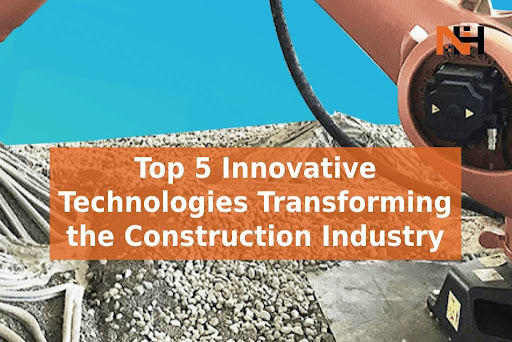
◈ Top 5 Innovative Technologies Transforming the Construction Industry
The construction industry has been undergoing a significant transformation in recent years, thanks to rapid advancements in technology. From improved efficiency to enhanced safety measures, these innovations are reshaping the way construction projects are planned and executed. In this article, we will explore the top five innovative technologies that are making a profound impact on the construction industry.
1. Building Information Modeling (BIM)
**Building Information Modeling (BIM)** has
emerged as a game-changer in the construction sector. BIM involves creating a
digital representation of a building or infrastructure, allowing stakeholders
to collaboratively design, construct, and operate projects. This technology
facilitates improved communication, reduces errors, and enhances overall
project efficiency. BIM also enables real-time collaboration among architects,
engineers, and contractors, streamlining the construction process.
2. Drones for Surveying and Inspection
**Drones** have become an integral part of
construction projects, offering a cost-effective and efficient solution for
surveying and inspection tasks. Equipped with high-resolution cameras and
advanced sensors, drones can quickly capture accurate data, monitor
construction progress, and conduct inspections in challenging or hazardous
environments. The use of drones minimizes human intervention, reduces project
timelines, and enhances safety measures on construction sites.
3. Augmented Reality (AR) and Virtual Reality (VR)
The integration of **Augmented Reality (AR)**
and **Virtual Reality (VR)** technologies has revolutionized the way
construction professionals visualize and plan projects. AR overlays digital
information onto the physical world, providing on-site workers with real-time
data and instructions. VR, on the other hand, creates immersive virtual
environments that facilitate virtual walkthroughs of construction designs,
allowing stakeholders to identify potential issues before construction begins.
4. 3D Printing in Construction
**3D printing** has gained traction in the
construction industry, offering a futuristic approach to building structures.
This technology allows for the precise layering of construction materials based
on digital designs, enabling the creation of complex and customized structures
with reduced waste. 3D printing in construction has the potential to
revolutionize the industry by significantly speeding up construction processes
and lowering costs.
5. Internet of Things (IoT) for Smart Construction
The **Internet of Things (IoT)** has found its
way into construction through the concept of smart construction sites. By
connecting various devices and sensors, IoT enables real-time monitoring of equipment,
materials, and environmental conditions. This data-driven approach enhances
project management, optimizes resource utilization, and improves overall safety
and efficiency on construction sites.
Conclusion
As the construction industry embraces these
innovative technologies, it is poised to undergo a transformative shift towards
increased efficiency, sustainability, and safety. From digital collaboration
with BIM to the automation capabilities of drones and the immersive experiences
provided by AR and VR, these technologies are reshaping the future of
construction. Embracing these advancements will not only drive construction
projects forward but also pave the way for a more sustainable and
technologically advanced industry.
